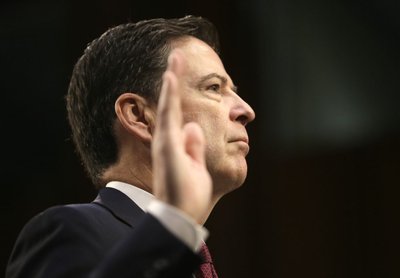
- Comey wrote that just a week after Trump was inaugurated in January 2017, he was invited to a private dinner at the White House with the president. Comey wrote, “The president said, ‘I need loyalty, I expect loyalty.’ I didn’t move, speak, or change my facial expression in any way during the awkward silence that followed. We simply looked at each other in silence.” Comey said that the president could always count on him for “honest loyalty,” but that as the FBI director he was not “reliable” in the conventional political sense. He noted that he and the president may have understood the term “honest loyalty” differently.
- Less than a month later on February 14, 2017, the day after former National Security Adviser Michael Flynn resigned, Comey wrote that Trump asked him about the investigation into Flynn’s ties with Russia. He quoted Trump as saying, “I hope you can see your way clear to letting this go, to letting Flynn go. He is a good guy. I hope you can let this go.”
- Comey said Trump called him at the FBI in late March 2017, and claimed that the Russian investigation interfered with his ability to govern and asked what he could do to “lift the cloud.”
- During the last one-on-one conversation between Trump and Comey on April 11, 2017, Trump reiterated the request to “lift the cloud” and asked Comey to “get out” that Trump was not personally under investigation.
- On May 9, 2017, nearly a month later, the president fired Comey. In a letter to Comey, Trump stated that the firing was necessary to restore “public trust and confidence” in the FBI.
By Amanda Wilcox, PBS NewsHour Extra's intern and a sophomore at Wake Forest University and Victoria Pasquantonio, PBS NewsHour Extra Editor.

